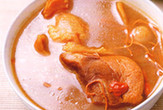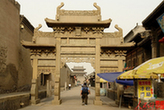In 1976 Mo Yan joined the People’s Liberation Army (PLA), a highly honored occupation and the dream of every Chinese boy at the time. He carried on with his writing as a soldier and in 1981 published his first work Falling Rain on a Spring Night in a local magazine where his troop was stationed. Three years later he entered the Department of Literature of the PLA Academy of Arts, and in 1985 his novella Transparent Radish brought him fame.
Over the past three decades he has published over 100 works, including novels, novellas, and short stories. In the preface to his latest drama collection Our Jing Ke, Mo Yan remarked that during all those years he had been writing about others and the outside world. This time he was writing about himself, about his inner world by “scrutinizing ‘me.’” To Mo, writing about “me” is an important part of writing about “humans.”
Hometown Inspiration
Old Gaomi County and its Ping’an Village where Mo Yan was born and grew up have provided unfailing inspirations for his literary creations since they were first portrayed as “Northeast Township of Gao-mi County” in his 1985 White Dog Swing. In the following three decades, “Northeast Township” and “Gaomi County” have remained the settings for his stories. “I hope to embody Chinese society in them,” he says of this fictional hometown.
Mo’s family, neighbors, and the upheavals and changes that have occurred in rural China in recent history can all be detected throughout his works, from Transparent Radish up to Frog. Readers can meet his grandparents in his 1987 work Red Sorghum Clan and his parents in Big Breasts and Wide Hips published in 1995. His own generation is depicted in Life and Death Are Wearing Me Out of 2006.
“My hometown is closely related to my works,” he commented after being awarded the prize. “In Gaomi we have clay sculptures, paper-cuts, New Year pictures and so on. I grew up with these art forms and folklore and have been enveloped in these cultural aspects. When I write, they all influence my creative style.”
Having grown up with the myths and legends of his hometown’s traditional pantheistic beliefs, Mo Yan fills his works with tales of monsters and evil. Zhang Yiwu, a professor of Chinese language and literature at Peking University, commented that Mo Yan portrays colorful ancient Chinese culture and traditional symbols in an unadorned and frank style.
Xu Zidong, a scholar now living in Hong Kong, remarked that Mo Yan’s success is attributable to his possession of the “multiple lucky numbers” needed to become winner of the Nobel Prize for Literature. He cited Mo’s devotion to rural life, his literary techniques of realism and stream of consciousness, and the fact that he has a good translator who has helped him promote his works to the English-speaking world and gain overseas support.
Zhang Qinghua, a professor at Beijing Normal University, interpreted Mo’s success by quoting Western views. On a lecture tour in Germany, Zhang asked his audience about their favorite Chinese writers and was given two names – Yu Hua and Mo Yan, the former for his closeness to the experiences of Westerners and the latter for his distinctive coloring of Chinese culture.
Mo Yan has rooted himself in the rural culture of northern China. Though he left the fields on the day he joined the army and has spent most of his time in Beijing since leaving the army, he has never been a real city dweller. “Opening the window in the city, my ears are filled with noises.” He never forgets his hometown and traditions, and even plants garlic and scallions, the two vegetables most enjoyed in Shandong, on his balcony.
Love of the ordinary Life
After Mo Yan won the Nobel Prize, Chinese readers’ passion for belles-lettres was rekindled and across the country copies of his books emptied from bookstores both online and on the high street. Mo Yan expressed hope that this sudden passion will spread to other Chinese authors of contemporary literature.
In today’s reading environment, set in a world of fast food and micro-blogs where everything is short, quick and easily digested, the Nobel Prize in Literature is a highly visible endorsement of Mo Yan’s works and may rouse people’s interest in reading generally. However, despite the current fuss and optimism in the out -side world, Mo Yan remains as reticent and serious as always, and is keen for the commotion to die down. “The Nobel Prize is a huge encouragement for me,” he says. “But I hope to escape this bustling, noisy world as soon as possible and get on with my life.”
Currently, Mo Yan is working on three projects – a libretto for a folk opera, a drama script, and a novel – each of which delves into various aspects of the Chinese world. “The folk opera is about a myth,” he said, “the drama is about a Chinese story that takes place abroad, and the novel is yet again set in Northeast Township of Gaomi County, a place I am quite familiar with.”
By Li Na(China Today)





Why not rent a boyfriend, or girlfriend to please parents during the Spring Festival?